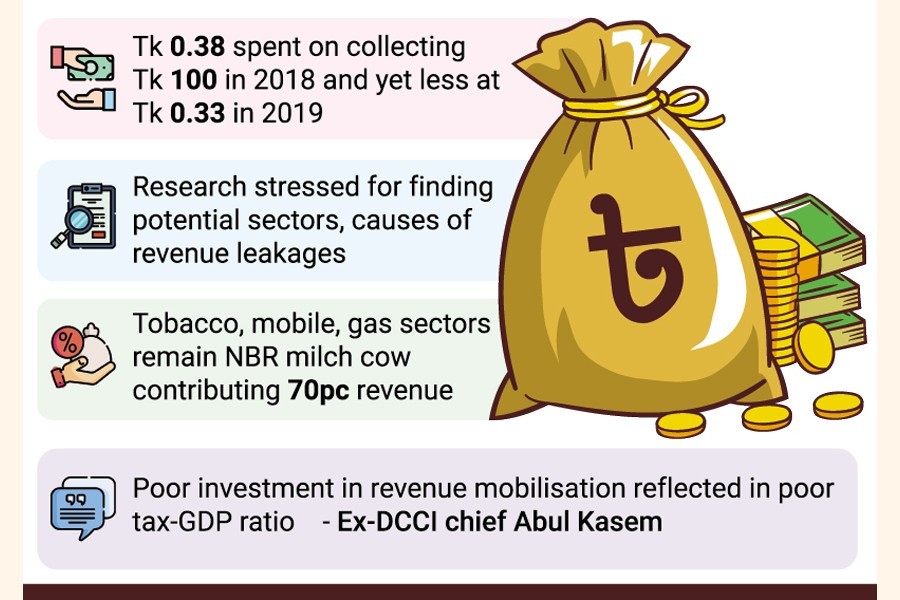Bangladesh invests the lowest among South Asian countries in domestic revenue mobilisation and thus misses out on potential multiple returns in public funds, studies related to budget deficits show.
A latest report of the Asian Development Bank (ADB) reveals that Bangladesh spent Tk 0.38 in 2018 on collecting Tk 100 in revenue. And the collection cost further fell to Tk 0.33 in 2019.
Total operating expenditure as a proportion of net revenue collected by India was Tk 0.61 in 2018 which rose to Tk 0.62 in 2019, says the report, titled 'A comparative analysis of tax administration in Asia and the Pacific' Fifth Edition 2022.
It is Tk 0.68 and Tk 0.63 for the Maldives, and Tk 0.46 and Tk 0.44 for Sri Lanka in the year 2018 and 2019 respectively, the ADB report shows.
According to Annual Report 2019-20 of the National Board of Revenue (NBR), its administrative expenditure for customs office (Brussels), prize, band roll, and stamp printing was Tk 6.69 billion for collecting Tk 2.16 trillion in tax revenue that year.
Except for this expenditure, the NBR spent Tk 0.28 for collecting Tk 100 in tax revenue, the annual report said.
The government spent Tk 2.20 billion for collecting Tk 714.32 billion in direct tax while Tk 3.01 billion for Tk 1.45 trillion in indirect tax in FY20. It is Tk 0.31 and Tk 0.21 in the collection of Tk 100 of that FY.
Sources concerned say the ADB data have been compiled through reconciliation of NBR and International Monetary Fund (IMF) data.
The ADB report was prepared by Richard Highfield and Annette Chooi, consultant advisor in international tax administration engaged by the Bank.
Former income-tax member Aminur Rahman says, "It's impressive that tax-revenue collection is growing fast despite poor investment."
He feels that the government should invest in select areas, including research and analysis, to find out potential sectors and causes of revenue leakages.
"We took initiative to open a research and analysis wing in the NBR in 2000, which the then finance minister also specified in his budget speech of that year," he said.
The initiative didn't, however, see the light due to the inaction of the NBR. Even it was not incorporated into the new organogram structure of the NBR in 2011 when the number of Members was increased to 16 from four, he added.
"Tax-related expenditures should not be concentrated only on payment of salaries and house rents," he said.
He pointed out that tax-revenue collection remained centered on three selective sectors --- tobacco, mobile and gas --- which contribute 70 per cent of revenue.
There is no analysis as to what other areas of potential tax collection are, Mr Rahman wonders over the shortcomings in revenue mobilisation when the government has to hunt for funds to make up for the budget deficit.
"The revenue board has a research wing that collects data from field offices across the country but I have doubt about its accuracy," he says.
Taxpayer-satisfaction surveys were conducted twice, by DFID and NBR, to sort out problems facing taxpayers but their feedback was not taken into cognizance by NBR high-ups, he regrets.
"Such ignorance of taxpayers' problems widens their gap with taxmen, breeding corruption."
On allocation for the tax department, Mr Rahman says the finance ministry remains always proactive in allocating funds to the NBR but the proposal should be sent explaining logics and facts.
Abdul Kasem Khan, Managing Director of AK Khan Telecom Limited and former president of Dhaka Chamber of Commerce and Industry (DCCI), says poor investment in domestic revenue mobilization is reflected in the poor tax-GDP ratio of Bangladesh.
He notes that mistrust between taxmen and taxpayers panicks people and encourages tax avoidance.
"People want to pay tax but the audit process should be free from harassment," says Mr Khan, who was also chairperson of BUILD.
He suggests that notices or letters served to the taxpayers should be written in decent language to remove the fear factor.
Investment is needed in automation and capacity building of taxmen to develop expertise in scrutinising tax files.
Experts have said investment in domestic revenue mobilisation should be a key priority for Bangladesh in the next two years to get prepared for graduating to a middle-income country from the status of a least-developed country in 2026.
While launching the Asia-Pacific Tax hub on May 3, 2021, ADB president Masatsugu Asakawa referred to domestic resource mobilisation as a 'major strategic priority' for the developing member-countries.


